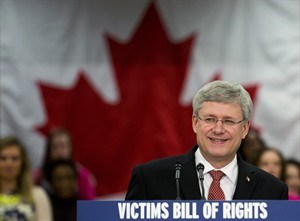
Prime Minister Stephen Harper announces the induction of legislation in Mississauga on Thursday, April 3, 2014 to create a Canadian Victims Bill of Rights.
Image Credit: THE CANADIAN PRESS/Nathan Denette
April 04, 2014 - 4:54 AM
OTTAWA - The Conservative government unveiled its long-awaited victims' rights bill on Thursday. Here are five things to take away from the legislation:
1. People could be compelled to testify in court against a spouse. The Canada Evidence Act currently gives spouses the right to refuse to testify, except in certain specific cases such as sexual assault or crimes against youngsters. The provision is based on the notion that a married couple is one person in the eyes of the law.
2. Victims would be able to find out much more about the offender. The bill would allow victims to ask for a copy of a bail order, details on an offender's correctional plan, a probation order or the details of a conditional or work release. They would also be able to ask for a copy of a recent photograph of the offender.
3. Victims would have the right to have the courts consider making a restitution order in all cases and to have such orders registered as a civil court judgment against the offender if the money isn't paid.
4. Victims would have the right to read an impact statement in or outside the court, or behind a screen. The court would also allow the victim or the person speaking on their behalf to carry a photograph of the victim taken before the crime, as long as it doesn't interfere with the trial.
5. The court must inform victims, if they ask, of any plea agreements reached between the accused and the Crown. Only two provinces — Ontario and Manitoba — have laws governing the role of victims in the plea agreement process. Ontario provides victims with access to information about any pre-trial plea arrangements. Manitoba gives victims the right to ask for information about "the possibility of discussions between the Crown attorney and an accused person, or his or her legal counsel, on a resolution of the charge."
SPOUSES COULD BE COMPELLED TO TESTIFY UNDER BILL THAT CODIFIES RIGHTS OF VICTIMS
OTTAWA - The government's long-awaited victims' rights bill would force people to testify in court against a spouse.
The legislation would change the Canada Evidence Act, which allows spouses to refuse to testify except in certain specific cases such as sexual assaults or crimes against youngsters.
The changes are part of a sweeping government bill that codifies the rights of victims, makes it easier for vulnerable witnesses to testify and requires that victims be given more information about cases.
Bill C-32, the Canadian Victims Bill of Rights, says victims have a right to be told when a criminal is deported or paroled and what parole restrictions may apply.
They will also have the right to have the courts consider making a restitution order in all cases and to have such orders registered as a civil court judgment against the offender if the money isn't paid.
CONSERVATIVES PUT VICTIMS OF CRIME IN COMMONS SPOTLIGHT
OTTAWA - The Conservative government is introducing a long-awaited victims' bill of rights in the House of Commons today, hoping to burnish its reputation as tough-on-crime Tories.
Prime Minister Stephen Harper is marking the occasion at an event in Mississauga, Ont., alongside Justice Minister Peter MacKay and Public Safety Minister Steven Blaney.
And with Harper out of town, the House of Commons committees will get a share of the spotlight today as they tackle key issues on Parliament Hill.
Executives from the Railway Association of Canada, Canadian Pacific Railway Ltd. and Canadian National will be before the Commons transportation committee talking about hauling dangerous goods.
Meanwhile, the Commons house affairs committee will continue hearings on Bill C-23, the government's controversial effort to change election rules.
The committee is hearing witnesses from the Assembly of First Nations, the National Pensioners Federation and the Native Women's Association of Canada.
Also giving testimony before the Commons defence committee are Defence Minister Rob Nicholson and John Forster, head of Communications Security Establishment Canada, the country's secretive electronic spy agency.
The Commons access to information, privacy and ethics committee will hear senior Mounties discuss identity theft.
In other Ottawa events:
— Statistics Canada releases international merchandise trade figures for February.
— Vadym Prystaiko, Ukrainian ambassador to Canada, gives an address at Carleton University entitled "Ukrainian Renaissance: Another Chance?"
— The Supreme Court will release its decisions on a variety of leave-to-appeal applications.
News from © The Canadian Press, 2014